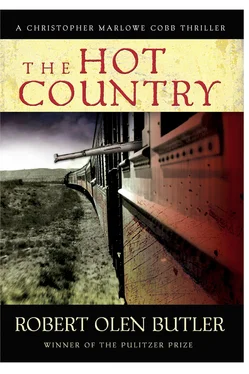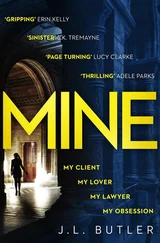I lowered my voice and said to Diego, “There’s a U.S. silver dollar in it this time.”
“All right, boss,” he said, sounding like my employee, and since I considered myself as devoid of sentimentality as Bunky was of irony, I was surprised to feel a beat or two of regret at this.
But at least before I spoke to him, I flagged a waiter and ordered a couple of boiled eggs. Then I said, low, “The Germans have a special place on Cinco de Mayo just off Esteban Morales .”
“I know this place,” Diego said, in a near whisper. “I saw the flag there. Black stripe, white stripe, red stripe.”
“Exactly. That’s their consulate. Where the German government is represented.”
“That man from the ship is there?”
I was about to confirm this — I even opened my mouth to speak — when it struck me that he had no way of knowing about the man if he had, in fact, beat it up the calle at the harbor, like he made a show of doing, and stayed there. He came back and shadowed all of us.
I closed my mouth without making a sound. Diego had been watching me closely. He knew what just dawned on me. Of course he did. I suddenly doubted if this kid made any slips. He’d deliberately let me know that he knew. And that he was good at all this.
“Yes,” I said. “The tall man. He has a scar on his cheek.”
“I should come get you when he goes out?”
“I bet you’re good at following people as well.”
He smiled.
“Follow him around and tell me where he goes, what he does. I don’t want him to see me yet.”
Diego gave a quick, deliberately sloppy salute. His body made the little flex and lift as if he was about to turn and dash off.
“Hang on,” I said. I pulled out a handful of pesos. “I want you on the job, so if I give you these, do you promise to use them to eat?”
“Sure, boss,” he said, grabbing the money.
“We’ll start in a couple of minutes. Go on out there where I can see you till the waiter comes. Those eggs I ordered were for you.”
He looked me in the eyes very steadily for a moment. And I didn’t have a clue about what was going on in his head. Ten years old tops and he could make himself unreadable. I thought: He’ll be a dangerous adult, this kid. Or a great one. Or both. Then he nodded and slipped out to the sidewalk.
Bunky had propped up his head with an elbow on the table and his palm to his cheek.
I pulled out Mother’s telegram.
So I warned her in my last cable to be very careful about working in a Storyville brothel, no matter how swank. Even though I did it mostly in the subtext, quoting Marlowe, I was expecting a hard pinch on the cheek from her in one way or another. And Mother delivered.
She wrote: Dearest Kit. Like untuned golden strings all women are, which long time lie untoucht will harshly jar. Vessels of brass oft handled brightly shine. You live your life and I’ll live mine. Your loving mother
This was also Christopher Marlowe, except for the salutation, complimentary close, and the line about minding my own business, which she’d even improvised into rhyme from her onstage talents. That was good advice, minding my own business. I did not want to ponder the subtext of this quote and what she might be doing in New Orleans. That was a story I would not cover.
The story I did cover the next day was for a whole pack of us to cover. A selective pack, however. The big dogs of the war correspondents. Davis and me and London. Arthur Ruhl from Collier’s and Frederick Palmer from Everybody’s . Lou Simonds from the Atlantic . A couple of the anonymous smaller dogs from the big-circulation outlets, the Associated Press, the United Press. We all ended up at the dinner table of General Frederick “Scrapping Fred” or “Fearless Freddie”—take your choice — Funston, lately installed as the man in charge of U.S.-occupied Mexico and lately installed in the house of General Maass near the Mexican barracks on the south end of town, with the Maass family stuff still around, from the piano to the matching pair of rocking chairs, from the couch-arm doilies to the white coral centerpiece on the dining table, from the bead curtains dividing the room to the dishes laid out for dinner to the parrot in the back room calling out drill orders in a man’s voice that had to be an imitation of Maass himself.
Funston’s first declaration when we all sat down was “I’m packing up General Maass’s things at the first opportunity and sending them along to him.” Like Funston needed to make it clear that our grabbing a Mexican city didn’t mean we’d grab some Mexican general’s dinner china as well. Funston paused for a moment to allow this declaration to register on us with all its ethical gravity, and in the silence, the parrot cried in Spanish, “About face. Forward march.”
We didn’t laugh. Funston was a little man, as small and thin as a teenage girl, and he was fidgety, with a little man’s exaggerated derring-do, and famous for bragging, after he made his mark as a general in the Philippines, that he personally strung up three dozen Filipinos without a trial and he suggested we do the same with all the Americans who had petitioned Congress to sue for peace in the Far East.
He laughed, however, at the voice from the other room. And he said, “As for the general’s parrot, he’ll be dead before tomorrow’s sunrise.” And he laughed again. An I-really-mean-it sort of laugh.
Richard Harding Davis laughed too, that companionable manly-man’s laugh of his. Most of the rest of us mustered an echo of it, from politeness, though Jack London just dropped his head and smirked at his dinner plate.
And we ate a meal from home — ham and cream gravy and boiled potatoes and macaroni and snap beans and pickles — and we were lectured by the general about our responsibilities to America and its righteous efforts here in Mexico. Knowing his reputation and hearing him lecture, I couldn’t help but think that it was a good thing a certain sniper I knew wasn’t aware of this man. Good for him, and good for her, too.
Later we sat on chairs in the courtyard and smoked cigarettes and drank coffee until we had the option of drinking a pretty swell Scotch, an option we all exercised, and Funston passed around editions of the big Mexico City newspapers from a few days ago. And in a collegial but grave tone he declared, “Read what your Mexican counterparts are saying, gentlemen.”
Those of us who knew Spanish translated in low voices for those around us who didn’t, creating an intense, low babble of vituperation in the room, which was no doubt part of Funston’s rhetorical plan. The headline in El Imparcial was “The Soil of Our Homeland Is Defiled By Foreign Invasion!” with a sub-head of “We May Die, But Let Us Kill!” El Independiente assured its readers “While Mexicans Were Massacring Gringo Pigs, Church Bells Rang Out Their Glory!” La Patria took a cleaner, more Hearstian approach in its headline: “Vengeance! Vengeance! Vengeance!” And there were half a dozen more of this ilk.
After we finished with the newspapers, spending less time with each one, Funston said: “You see, boys, what you’ve got to counteract? And I have to admit, from all our own reports, these papers accurately reflect the attitude of the Mexican people as a whole. An attitude that’s typical, in my experience, of uncivilized people. Our fellow Americans need to know what the reality is down here.”
And the extra dose of reality that all us boys were hearing in these words was that our stories were now going to follow the Army’s agenda, Funston’s agenda, or they wouldn’t be allowed out of this town. We passed the newspapers back to Funston and he accepted them in silence while the parrot screamed wordlessly in the background.
Читать дальше












